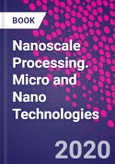Nanoscale Processing outlines recent advances in processing techniques for a range of nanomaterial types. New developments in the processing of nanostructured materials are being applied in diverse fields. This book offers in-depth information and analysis of a range of processing techniques for nanostructures, and also covers nanocharacterization aspects thoroughly. Topics covered include zero dimensional nanostructures, nanostructured biomaterials, carbon-based nanostructures, polymeric and liposomal nanostructures, and quantum dots. This book is an important resource for materials scientists and engineers looking to learn more about a variety of processing techniques for various nanomaterial classes, for use in both the industrial and biomedical sectors.
Please Note: This is an On Demand product, delivery may take up to 11 working days after payment has been received.
Table of Contents
- Basic concepts and processing of nanostructures materials
- Nanomaterials: Synthesis, physicochemical characterization, and biopharmaceutical applications
- One-dimensional (1D) nanomaterials: Nanorods and nanowires; nanoscale processing
- Carbon-based nanostructures and nanomaterials
- Fabrication of nanostructures by physical techniques
- Liposomal nanostructures: Properties and applications
- Quantum dots: A brief introduction
- Magnetic nanoparticles
- Nanoscale self-assembly
- Nanocellulose and its composite films: Applications, properties, preparation methods, and limitations
- Nanostructures for biomedical devices
- Nanostructures for humidity sensing and photocatalytic applications
- Nanostructures for antimicrobial therapy
- Nanocomposites of polymer matrices: Nanoscale processing
- Hybrid organic-inorganic nanostructures in proton exchange membranes for fuel cells
- Nanostructured hydroxyapatite biomaterial as gas sensor
- Processing strategies of chitosan-built nano-hydrogel as smart drug carriers
- Ultradeformable liposomal nanostructures: Role in transdermal delivery of therapeutics
Authors
Sabu Thomas Professor, School of Energy Materials, Mahatma Gandhi University, India.Prof. Sabu Thomas is a Professor of Polymer Science and Engineering and the Director of the School of Energy Materials at Mahatma Gandhi University, India. Additionally, he is the Chairman of the Trivandrum Engineering Science & Technology Research Park (TrEST Research Park) in Thiruvananthapuram, India. He is the founder director of the International and Inter-university Centre for Nanoscience and Nanotechnology at Mahatma Gandhi University and the former Vice-Chancellor of the same institution.
Prof. Thomas is internationally recognized for his contributions to polymer science and engineering, with his research interests encompassing polymer nanocomposites, elastomers, polymer blends, interpenetrating polymer networks, polymer membranes, green composites, nanocomposites, nanomedicine, and green nanotechnology. His groundbreaking inventions in polymer nanocomposites, polymer blends, green bionanotechnology, and nano-biomedical sciences have significantly advanced the development of new materials for the automotive, space, housing, and biomedical fields. Dr. Thomas has been conferred with Honoris Causa (DSc) by the University of South Brittany, France.
Preetha Balakrishnan Principal Scientist, ADSO Naturals Private Limited, Banglore, Karnataka, India. Preetha Balakrishnan is Principal Scientist at ADSO Naturals Private Limited, Banglore, Karnataka, India. Her area of interest is Polymer Science incorporating Nano materials, and topic of research is Starch based nanocomposites at IIUCNN, M.G. University, Kottayam, in the group of Prof. Sabu Thomas.







